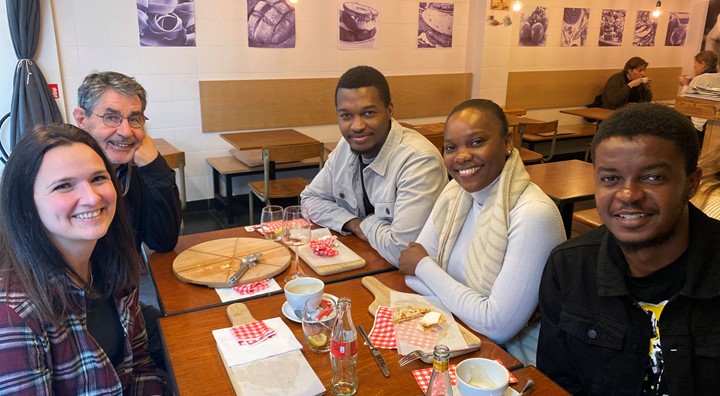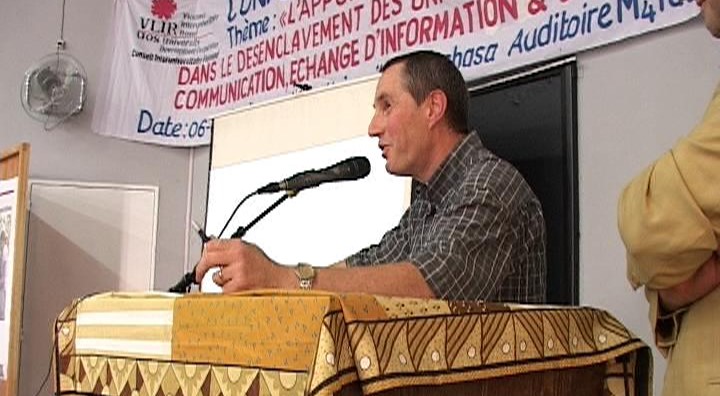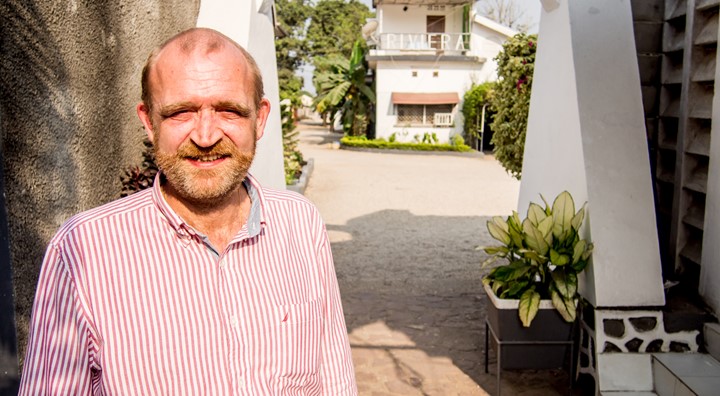Stories

Wim Deferme
09/07/2024Senegal 2015: Jeroen Aerts and Joachim Broeders, two of our UHasselt engineering master students construct a windmill to power PC’s in a local school in Warang. Batteries are used to buffer the energy when the windmill produces electricity but there is no power shortage. – One year later: batteries are sold to cover for the increasing costs in supporting pupils going to school. The windmill still works, but is not used anymore for its purpose. Learning: without a clear business plan and awareness creation about the solution, engineering solutions will not be sustainable.
Togo 2016: Kaz Puttenaers and Daan Droogmans, two of our UHasselt engineering master students team up with Lore Van Welde, a master student from economics. The idea is to make a “library” of batteries to be lend out to villages surrounding a farming community in Lomé, Togo. The business plan is built to accommodate the degradation of the batteries: 500+ cycles should be reached to earn enough money to buy new batteries. Six months (approx. 200 cycles later), batteries are degraded or even worse not brought back to the local farming community for new loading.
At the same time in a primary school in Ukunda, Kenia: Jason Serdons, Sven Bonhomme, PieterJan Oudebrouckx and Simon Wauters, 4 of our students reconstruct a kitchen to replace cooking on
wood solely by cooking with preheated (solar-heated) water and wood. The local construction workers really like the idea (even reverse engineer the solar heater) and see potential in restaurants
along the coastline. However, no financing is available to start up the business.
Learning: Sustainable solutions, consisting out of engineering with integrated business plans only work when the local community adopts the idea and is supported in business creation.
Hasselt/Lubumbashi 2022-2024: A team of Flemish students, under the guidance of Luc Bijnens and Steven Abrams (statistics UHasselt), works on a solar cooker concept from waste materials to accommodate small scale cooking in the Lubumbashi region. The students test their prototype in the summer of 2023 with a visit to Lubumbashi where a team of Congolese students help them re-design
their prototype. The academic year that follows, new teams of both Flemish and Congolese students work on an adapted and improved solar cooker prototype, testing it in the summer of 2024 again in
Lubumbashi. In the meantime, discussions regarding business creation to bring the solar cookers from local (waste) materials to the market are ongoing. It will probably take one more year, and the involvement of students from business economics and social sciences, to achieve this goal: a sustainable, well-designed and engineered solar cooker.
The examples above clearly state that for renewable energy adoption (globally), technology (eventually combined with business) is not (always) a sustainable solution. Community involvement and the adoption of the idea by the local community is necessary. To achieve this, a “fast” and “one- directional” project where our students implement a solution as part of their masterthesis or a one-year project is not the solution. It rather consists of multicultural and multidisciplinairy approaches where different stakeholders learn from each other and combine their insights and expertise to achieve a sustainable solution. Let’s reach out to each other to form global partnerships of multidisciplinary expertise to solve the urgent challenges of this era, achieving global sustainable development.

Els Hannes
31/05/2024Dear Daniel,
About 12 years ago we started collaborating, your university in Dar es Salaam, Tanzania and my university in Hasselt, Belgium. You visited us for the first time to attend a joint master thesis defense in June 2013. Since then, the number of joint research and education activities has only grown.
The intensity of the current collaboration between our universities doesn’t stay unnoticed. Since 2021, our universities are connected in a 10-year VLIR UOS IUC-programme in which we aim at training 44 PhD students and 40 Master students, amongst other things. People often ask me: how did it all start? Not out of mere curiosity but rather to know how to build such a successful collaboration. What would be your answer?
One of the main ingredients, according to me, is ‘human connection’. Finding a reliable contact with shared interests and vigor is key. For us, it started with a recommendation of some influential professors in Belgium (prof. Han Verschure) and Tanzania (prof. Livin Mosha) who had built a professional relationship and friendship long before – I’ll be forever grateful that they’ve shared their network so generously. So I reached out, and there you were…
And it worked. Since then, we’ve contributed to successful project applications: a VLIR UOS South Initiative, multiple Erasmus+ Credit Mobility Projects, UHasselt Incentive Fund projects, BOF-BILA applications. And we’ve submitted projects that failed to convince the donors: VLIR UOS Team projects, Erasmus+ Capacity Building projects... That didn’t stop us from trying, though. Several people joined the BE-TZ-team on both sides and eventually, all together, we managed to win an impactful VLIR UOS IUC-programme to build capacity at Ardhi University. All this time, you had been my loyal partner-in-crime.
So of course it was a bombshell when you announced that you would leave Ardhi University in 2022. A prestigious job at the Tanzanian Central Bank was waiting for you. I could have known that a talent like you would be headhunted one day. Luckily, a solid foundation for the collaboration between our universities was already set at that time, and the IUC programme is in safe hands with the coordinators, prof. Gabriel Kassenga and prof. Rob Cuyvers, their management team and all the sub project team leaders and team members.
And luckily, time has shown that switching jobs doesn’t necessarily mean that the connection will be lost. You are still there. I know that I can call you when I need advice related to our collaboration. I know that you are still keen to see how the projects evolve.
In February 2023 in Tanzania, together we’ve celebrated one of our many activities: 10 years of student exchanges in architecture. We threw a pizza party for the Tanzanian exchange alumni. It was heartwarming to hear their enthusiastic stories about one year of studies in Belgium and the impact that this has had on their personal and professional development. It was moving to feel their gratitude towards the people who have helped to make this happen. Maybe in life, it is not so much about what you achieve, but what you mean to other people?
Daniel, my friend, you mean a lot to me. Thank you for your continued support. Thank you for being there.
Regards to Prisca and your lovely daughters, Camila and Pamela.
Warmly,
Els

Liesbeth Oeyen
18/03/2024It’s a typical cold, grey day in Hasselt when I meet Irene, Thomas and Curthbert, MSc scholars in the VLIR-UOS IUC-project with Ardhi University (ARU) in Dar es Salaam (Tanzania). Their big smile immediately brings a warm feeling into the room and when we start talking about their stay in Belgium, they immediately mention that the most difficult thing to adapt to was the Belgian weather. They have been studying and living in Hasselt for almost six months now and luckily all three of them really feel at home here.
I ask them about their expectations before they arrived and how it has been different from what they have experienced so far. To my pleasant surprise their answer is “We expected it to be difficult to integrate in Belgium, but this was not the case at all because everyone is very helpful and friendly and speaks English”. Irene was especially surprised how organized the city of Hasselt is and Thomas and Curthbert are inspired by the Belgian public transport.
In a few weeks, two of them are going back to Tanzania and so I ask them to tell me something about what they have learned in their study programmes at UHasselt and will take back home. Immediately, it is clear that their stay does not only have a personal impact. Irene, Thomas and Curthbert are lecturers and tutors at ARU and plan to share the experiences and skills they acquired in Belgium during their teaching assignments. They all confirm that they have broadened their horizon, got in touch with different views, see opportunities from a different perspective and can give students better advice.
Furthermore, all three of them hope to share their knowledge beyond the university walls. In Tanzania, the national government often calls upon the expertise of academics (consultancy) for the implementation of new projects. Irene hopes that the government will consult her so she can share what she has learned with respect to adaptive reuse. She emphasizes that in Tanzania there are many cities with heritage buildings and thanks to the MSc programme at UHasselt she has learned to see the potentials for these buildings. Thomas and Curthbert want to take home the intelligent transport solutions and advanced technologies that they familiarized themselves with in the MSc programme in Transportation Sciences. They reveal that in Dar es Salaam a lot of focus is put on the infrastructural aspect of transportation, but that it is crucial to also incorporate technology. The students give as example that in Dar es Salaam, bus stops are always very crowded because people are waiting for hours, since they don’t know when the bus will come. As a result, public transport is only used by the poorest layer of the population and traffic is terrible because everyone prefers to use cars, boda boda (moto taxis) and bajaji (tricyles). The technology of having an app in which you can see the timetable, stops and even live tracking of a bus is something Thomas and Curthbert learned during their stay in Belgium and found very inspiring.
Within ARU, the three scholars want to promote the use of shared google drive, implement an information sharing platform (e.g. blackboard) and advocate for (free) access to software for students.
My last question for our Tanzanian visitors is what UHasselt could learn or implement from ARU. Irene, Thomas and Curthbert think about it for a minute and then unanimously respond that the continuous assessment system in ARU (70% final exam, 30% other tests/assignments) could serve as example for UHasselt. During the academic semester here, all three of them experienced the lack of feedback and had the feeling they didn’t really know how they were doing and progressing.
Sharing good practices between universities across the globe thus remains inspiring, as we can all learn from each other.
Thank you Irene Msuya, Thomas Njanda and Curthbert Njele

Marc Thoelen
19/02/2024In the Mid ‘90s, with the rise of PC’s and the early Internet, it became common within the 5 Flemish University Computer Centres, to travel to ‘the South’ to assist universities in adapting these new technologies within their local environments. After a first short mission to Lusaka, Zambia (training network technologies), I was asked by VLIR-UOS to head a major project in the D. R. Congo, consisting in installing a ‘backbone’ fiber network between the 10 faculty buildings on the main campus of the University of Kinshasa (UNIKIN). At the same time, UNIKIN would be connected to the Internet via a satellite antenna receiver.
The majority of the equipment was shipped from Belgium, but, as much as possible, local people/companies were hired to do the on-site work, e.g. digging trenches, drilling holes, installing cabinets, etc.
In general the project became a success, in the sense that it is still until today delivering network facilities to the whole university community.
At the same time it marked the ‘revival’ of Belgian Development aid to the DRC, which had more or less stopped due to the civil war in the late ‘90s.
I personally gained a lot of experience, but also many good friends, which remained active through several upcoming projects in e.g. Lubumbashi and Kisangani.
It finally shows that not only members of the Teaching Staff but also technicians or others can be eligible and most welcome in some of these challenging projects.

Jean-Michel Rigo
08/01/2024Global partnership projects: academic research included
What makes VLIR-UOS projects on Global Partnership less attractive for academics than EU- of FWO-funded projects? The administrative burden? Not really: VLIR-UOS did a great job in simplifying the processes of the calls, reporting, etc, though it can still be ameliorated. The difficult language of this type of project? Neither: Horizon Europe or Erasmus language are not easier. The lack of a true scientific research dimension? This is the most tricky, indeed. Some of those projects are easily connected to forefront research when the research questions are directly linked to the regions with which one collaborates: think about epidemics, environmental or biodiversity studies. Some are more difficult to get associated with ‘excellent’ research. Some have nothing to do with research. For example capacity building as such, like helping students to acquire IT skills, building the foundation of a research coordination office of learning teachers how to make attractive slides.
Moreover, most of the time, those projects are not recognized at the same level as other projects for the promotion of researchers, not to say that Global Partnership projects take more time than more ‘classical’ research projects.
Something to put on the agenda of our university councils if we want that the new generation also engage themselves in Global Partnership.

Jean-Michel Rigo
08/12/2023My involvement in ‘University Development Cooperation’ began thanks to a personal relationship. I freshly arrived at the LUC (the ancestor of UHasselt) when Paul Steels, a colleague of mine, entered my desk room to ask: « For years, we are trying to set up a project of medical education in Congo, without success. You speak good French, are you interested by leading it? ». The first trial was not successful, but the second trial was successful. We could do a second project with the faculty of medicine of the university of Kinshasa.
My third experience with Congo also began thanks to a personal relationship. It was another Paul, Paul Janssen, who asked me to lead the transversal part of the newly starting Institutional University Cooperation (IUC) project with the university of Kisangani. From capacity building at the level of a faculty, I went to the level of a university. I kept doing this in other IUCs (Meknes in Morocco, Lubumbashi in DR Congo).
What makes me rich of these experiences? I met humans with the same fundamental questions, with the same hope: that knowledge, academic values, are necessary to help the world face the challenges of our times.
Global partnership is the new name of University Development Cooperation. Besides partnership between institutions, relationship between people and even friendship may be the most important drives of my engagement in university cooperation.
- © 2024 2022 - Hasselt University
- Terms of use - Privacy statement - Cookie policy
- Reset cookies
